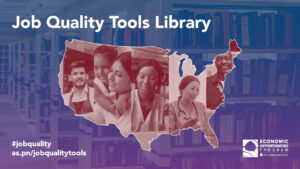The Ray Marshall Center is pleased to announce support from JPMorgan Chase to study the pathways taken by Opportunity Youth in Austin, Dallas, Houston, and San Antonio. This $750,000, five-year grant represents one of the largest efforts undertaken in Texas to date to study the systems that serve, and the trajectories taken by, disconnected young adults (between the ages of 18 and 24 who are neither enrolled in school nor working) after participation in a youth-serving program. The study aims to determine the size of the OY population in each of these cities, as well as measure programmatic impact in terms of employment and/or enrollment in postsecondary education. In addition to providing a clearer picture of the OY landscape, it is our expectation that the study findings will inform OY policy for the state.

Data Linkage for LEO’s Texas Research Study
| Principal Investigator: | Ashweeta Patnaik, MPH |
| Sponsor: | Wilson Sheehan Lab for Economic Opportunities, University of Notre Dame |
| Project Duration: | June 2021 – June 2023 |
| Description: | The Wilson Sheehan Lab for Economic Opportunities (LEO) at the University of Notre Dame conducts impact evaluations in partnership with non-profit and government agencies focused on reducing poverty by creating evidence based programs that move people from poverty to self-sufficiency. LEO is currently conducting a large research study in Texas to test assumptions about self-sufficiency programs. The research examines the impact of multiple self-sufficiency programs being implemented in locations across the state of Texas. Partners include Catholic Charities of Galveston-Houston, the Goodwill Excel Center in Austin, Catholic Charities of Dallas, Jewish Family Services, NPower, Combined Arms, and Lubbock County, and the Tarrant County Homeless Coalition. This research will help in understanding the impact of anti-poverty programs on populations ranging from school age children, to elderly, to veterans to people and families at low-income levels.
LEO is partnering with the Ray Marshall Center (RMC) at The University of Texas at Austin to utilize state administrative data to support this research. LEO and RMC researchers will use the data to demonstrate the impact of these self-sufficiency programs on outcomes such as earnings, employment and public benefit usage. By testing what works to move people to self-sufficiency, LEO and RMC will inform and improve poverty programming across the state and inform policymakers as they make decisions about funding and programming. |
| Reports Available: |
Nuru Ethiopia, Nuru Kenya, and Nuru Nigeria Impact
| Principal Investigator: | Heath J. Prince, PhD |
| Sponsor: | Nuru International |
| Project Duration: | April 2021 – February 2025 |
| Description: | The Ray Marshall Center will assist Nuru International’s M&E team with analyzing and reporting Nuru Ethiopia, Nuru Kenya, and Nuru Nigeria’s impact. |
| Reports Available: | Nuru Kenya 2023 Dairy Impact Brief Authors: Heath Prince and Thomas Boswell (Ray Marshall Center); Fatuma Nyanjong (Nuru Kenya); and Casey Harrison, Matt Lineal, Ian Schwenke, and Bethany Ibrahim (Nuru International) Date: December 2023 Publication Type: Research Brief, 6pp. This report is commissioned by Nuru International Nuru Nigeria 2023 Endline Impact Report Nuru Ethiopia 2022 Impact Report Nuru Kenya 2022 Dairy Report Nuru Ethiopia 2021 Impact Report Nuru Nigeria 2022 Short-Term Impacts Nuru Nigeria: 2021 Midpoint Impact Report 2019 Nuru Nigeria Baseline Report |
Project Summary: Examining Reproductive Health Services of Women, Female Youth, and Female Refugees in Northern Jordan with a Behavioral Economics Lens
The Dutch Research Council has published a project summary for Examining Reproductive Health Services of Women, Female Youth, and Female Refugees in Northern Jordan with a Behavioral Economics Lens titled “Behavioural economics-inspired counselling helped to reduce pregnancies in Jordan” dated June 7, 2021. RMC’s Research Scientist Dr. Heath Prince led the project team in the United States which ran from 2017 to 2020. You can read more about the project here.
Introduction:
A behavioural economics experiment demonstrated that women in Jordan tended to make more use of modern family planning methods after the introduction of an innovative contraceptive counselling approach. Insights from behavioural economics were used to design text-based messaging reminders and to revise training and counselling guides used by midwives, resulting in women continuing to use modern family planning methods for longer.
American Graduate video explainer: HS students training to be EMTs upon graduation
Looking for a career that can help others, Lauren entered the Pflugerville ISD Fire/EMT Academy, which trains high school students to become certified EMTs. Now she’s a sophomore at Texas A&M Commerce in a pre-med course with hopes of becoming a nurse practitioner in the ER.
*The Ray Marshall Center is proud to be one of the local partners, joining Austin Community College, the Office of the Mayor of the City of Austin, Travis County Judge’s Office, and Workforce Solutions Capital Area in the grant.
To read more about the initiative and see updates, please visit the dedicated website.
American Graduate video explainer: Getting Certified for Construction While in High School
Jorge is a senior at Crockett High School in Austin, Texas. As a freshman he was introduced to a Career & Technical Education (CTE) program that will allow him to graduate high school with the knowledge and skills to start an entry level job in construction. Right now, he has his eye on trade school and concrete, and his variety of interests and strong work ethic will ensure he finds success in his chosen field.
*The Ray Marshall Center is proud to be one of the local partners, joining Austin Community College, the Office of the Mayor of the City of Austin, Travis County Judge’s Office, and Workforce Solutions Capital Area in the grant.
To read more about the initiative and see updates, please visit the dedicated website.
Dr. Prince pens op-ed on construction worker exploitation for Austin American-Statesman
RMC’s Director and Research Scientist Dr. Heath Prince recently wrote an op-ed in the Austin American-Statesmen titled “Worker exploitation in Texas’ throwaway culture” published December 13, 2020. The piece touches on the exploitation of the construction workers, especially during the coronavirus pandemic. You can read the article here.
![]()
American Graduate video explainer: The Child Care Dilemma
The pandemic has revealed the importance of child care for a strong economy, especially for working mothers. Yet the majority of those employed in the industry don’t earn a living wage, forcing them to depend on public income support. Those who love the profession and realize its importance have to make hard economic decisions just to stay afloat.
*The Ray Marshall Center is proud to be one of the local partners, joining Austin Community College, the Office of the Mayor of the City of Austin, Travis County Judge’s Office, and Workforce Solutions Capital Area in the grant.
To read more about the initiative and see updates, please visit the dedicated website.
American Graduate video explainer: Training nurses amid COVID-19
Amid COVID-19 job losses, the demand for medical professionals in certain sectors remains high, and one local training program is lifting people out of lower-wage jobs and into these vital nursing positions. Austin PBS’s Decibel spoke with Capital IDEA about how they’re working to help meet the nursing demand with training.
*The Ray Marshall Center is proud to be one of the local partners, joining Austin Community College, the Office of the Mayor of the City of Austin, Travis County Judge’s Office, and Workforce Solutions Capital Area in the grant.
To read more about the initiative and see updates, please visit the dedicated website.
RMC work featured in Aspen Institute’s recently launched Job Quality Tools Library
The Aspen Institute Economic Opportunities Program recently launched the Job Quality Tools Library, a platform to support leaders to strengthen job quality in their own organizations, in the businesses they partner with, and across labor markets. The library offers tools, resources, and guidance to help a variety of organizations – including workforce development, worker advocacy, policy, investing and lending, economic development, and employers – engage in practical action to improve jobs.
In the library, you will find tools to support workers and businesses during and after the current crisis, including a special section of resources focused on urgent responses to COVID-19. You will also find our contribution “Partnering for Equity: How Sector Partnerships are Tackling Workforce Disparities” in the Equity and Inclusion tool featured in Section 4: Strengthening Practices to Improve Job Quality. As we come together to focus on relief in the short-term and building a more inclusive economy in the long-term, tools and approaches to foster high-quality, economy-boosting jobs are more critical than ever.
You can learn more and visit the library here.

- « Previous Page
- 1
- 2
- 3
- 4
- …
- 10
- Next Page »

